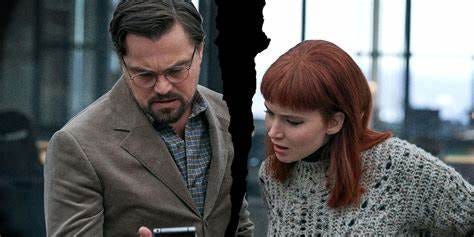This article contains some minor spoilers to the movie Don’t Look Up. If you haven’t watched it yet, you can stream it on Netflix.
It’s hard for me to nail down what comedy appeals to me, but one writer who seems to get my sense of humor is Adam McKay. Talladega Nights has long been one of my favorite comedies, as has The Big Short. Needless to say, I was all in for his latest, Don’t Look Up.
I quite enjoyed the movie. I thought the Orleans (Meryl Streep & Jonah Hill) were a little over the top, and while I liked most of Mark Rylance’s dialogue as Peter Isherwell, I wasn’t so much a fan of his acting choices. But I thought the rest of the cast was great, that the swings between humor and drama were handled well, and that the message was pretty straightforward. Not as good as The Big Short or Vice, but a solid entry in McKay’s filmography. I’d give it a solid B.
So I admit, I was surprised to see it get a middling score from the critics. I didn’t think it would be one of those 90% scores on Rotten Tomatoes, but seeing it at 55% threw me a bit. But whatever. Sometimes critics don’t like movies that people like. Step Brothers by Adam McKay ALSO got a 55% and I still think it’s pretty funny.
What is truly fascinating to me has been the way the media has glommed onto this particular split critical response.
I cannot count how many articles I have read, not about the movie itself, but about the response to the movie. And this, I think, proves Adam McKay’s point.
After the scientists go to the President about the impending end of the world with no luck, they move to the news media, hoping to get the attention of the public, thus putting pressure on the administration to act. Dr. Mindy and Ms. Dibiasky (Leonardo DiCaprio and Jennifer Lawrence) leak the story to The New York Herald a, stand-in for the New York Times, and book an appearance on The Daily Rip, a stand-in for Morning Joe.
What struck me about this was that McKay chose mainstream, liberal-leaning media outlets to parody. He could have parodied programs like InfoWars or Tucker Carlson, or even Fox & Friends or The National Review - the kind of broadcasts or publications that are more frequently satirized in films of this nature. Instead, he chose outlets from his side of the political aisle (or at least, closer to his side than FoxNews) to poke fun at for missing the mark for decades on climate change by choosing to present both sides of a debate that has only one side. A decision driven less by the desire to inform the public, but instead to garner the highest viewership.
And that brings me to the main point of this piece. These same media outlets shifting the discussion away from the secondary point of this movie (that ALL of the media is complicit in the climate crisis, not merely left-wing media outlets) to talk about why critics don’t like the message about climate. David Sirota, the writer along with McKay, tweeted this last week, and honestly, I think he makes an excellent point.


The CNN piece says that this film “only alienates those who most need to be moved by its message.” But what if the deniers aren’t the ones who need to be moved? What if the people who need to be moved are the members of the press who choose, time and again, to ignore the threat of climate change to make sure that enough people of all political stripes keep reading or watching their content?
Science becomes political when legitimate news outlets make a choice to present opposing views as viable. Vaccine hesitancy didn’t start with Covid, it has existed pretty much since the first vaccine. However, in the 1980’s, it gained far more traction because anti-vaccine movement was given credibility through a news reporter’s documentary. And when Andrew Wakefield published his faulty study linking childhood vaccinations to autism, it gained far more traction when 60 Minutes gave him time to spread his lies. The media obsession of something that was disproven has fueled an anti-vaccination movement that had left millions unvaccinated from a deadly pandemic. Yes, right-wing media groups have fanned the flames in this particular instance, but the fire was started decades earlier by people who should have known better.
So, MacGuffin or Meaning?
I think this movie has pretty deep meaning, I just think it’s found in the secondary plot. Sure, the look at climate change is important, and I think it does a pretty good job with that. But where it really shines is in its look at how we talk about climate change (or a pandemic or the fate of democracy or racism or any number of issues that are labeled political while not actually being political). That real life has almost immediately proven what McKay and Sirota said in Don’t Look Up is kind of amazing.


